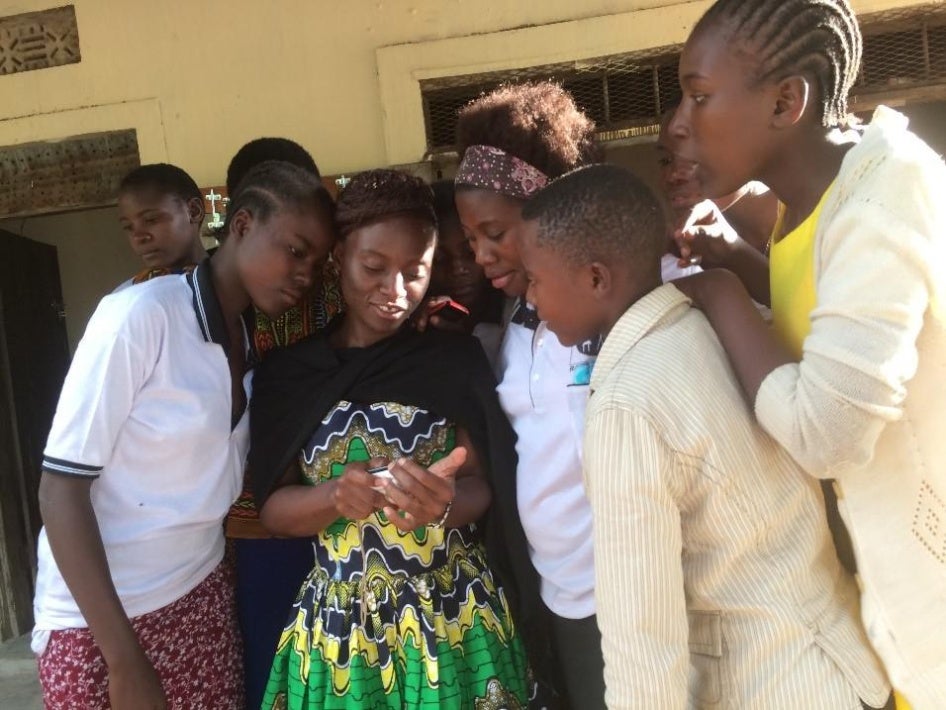“When you get education it builds your head so you learn how to overcome any challenges in life,” Stella, a 17-year-old girl living in the dusty town of Kahama in northwestern Tanzania, told me recently when I interviewed her at the tailoring center she now attends to learn the trade. Stella told me that when she was 14, she had passed all her exams to proceed to middle school, but then found out she was pregnant. Like millions of adolescent girls before her in many countries, Stella knew that being pregnant meant she would be barred from attending school.
In Tanzania, like many other countries, stringent policies excluding pregnant girls and young mothers from schools allow school officials to conduct regular pregnancy tests and expel girls who are found to be pregnant. Stella had a miscarriage when she was six months pregnant, but the school doors had already been closed. Since she knew secondary expenses would be a heavy burden on her family even if she could get an exception, she accepted the situation, she told me sadly.
Globally, more than 34 million adolescent girls are out of school. Teenage pregnancy is one of the key factors. Punitive laws, policies, or measures aimed at preserving ”moral standards” in many countries -- including Tanzania, Sierra Leone and South Africa—exclude these girls from the classroom.
In many places, policy makers describe the 124 million children and adolescents who are not attending school as “left behind.” And this figure may not even include girls like Stella, who may have become invisible to Tanzania’s education system when she was removed from her school’s attendance list.
Children with disabilities, refugee children, and children from various ethnic minorities often face particular obstacles to getting an education. Millions of children with disabilities are turned down when they try to register at their neighborhood schools, and those who overcome the obstacles and discrimination often drop out because they don’t get the support they need to thrive. Parents of many refugee children must deal with endless bureaucratic hurdles to enroll their children in school, and children suffer discrimination and bullying in schools in many host countries. Frequently, adolescent refugees have nowhere to go because host governments impose cumbersome requirements or charge fees they can’t pay.
Most governments have signed on to binding international human rights treaties, which require them to ensure that no child or young person is denied an education. In September 2015, all governments agreed to work together to “ensure inclusive and quality education for all” by 2030, as part of the UN-endorsed Sustainable Development Goals, making access to secondary education a global target for the first time. But not all governments are making sure they carry out their obligations.
In global debates, the “international community,” ---an abstract term that encompasses UN member states, UN agencies, financial institutions supporting development programs, among others—is often named as responsible for ensuring that the commitments to provide education to every child are kept. But we found in a new report that this collective responsibility is short on specificity and accountability.
There has long been an “education deficit”—a shortfall between the educational reality that children experience around the world and what governments have promised and committed to through human rights treaties. Some governments have adopted stronger measures to ensure that more children get a good education, but not all governments are on the same page. Many continue to tolerate abuses against children in and out of schools. That same international community should press these governments to develop specific measures to ensure that all children and adolescents can and do attend school.
Children like Stella have plans and hopes: “I would like to continue school. I want to have a better future… My dream is to become a business woman who owns her own clothes and is a tailor.” This shouldn’t just be a dream for Stella. Girls and boys around the world shouldn’t have to consider education a possibility. Their right to education should be guaranteed by their governments.










